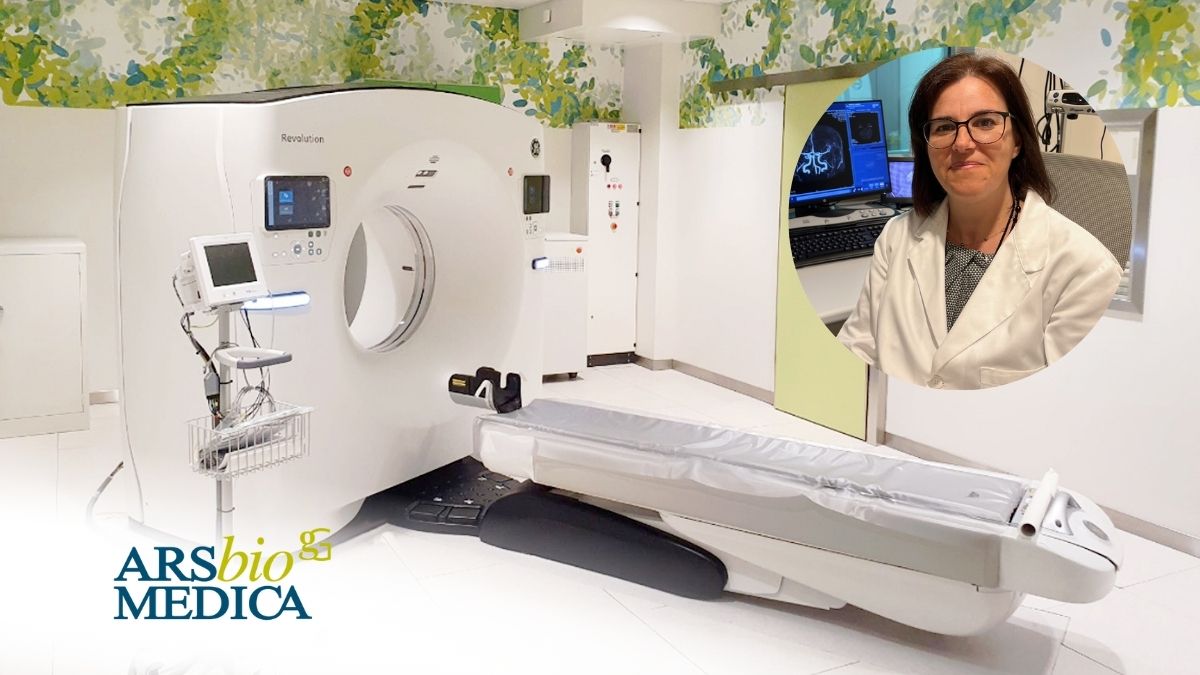
Articolo del 05/11/2024
Meningiomas are relatively common intracranial tumors that originate from the meninges, the protective membranes covering the brain and spinal cord. Most meningiomas are benign, grow slowly or remain stable over time, and are often incidental findings during brain CT scans performed for other reasons.
Typically asymptomatic, meningiomas may only cause clinical symptoms when they reach a significant size or are located in critical areas of the brain.
A Computed Tomography (CT) scan of the brain is a key diagnostic tool for detecting meningiomas, determining their size and location, and planning any necessary surgical intervention.
We discussed this with Dr. Chiara Andreoli, neuroradiologist at Arsbiomedica.
What is a Meningioma?
A meningioma is a common type of brain lesion, accounting for approximately 30% of primary intracranial tumors. These tumors can occur in various regions of the brain, typically grow slowly, and are often benign. Small meningiomas are usually asymptomatic, but larger ones can cause a range of symptoms, including headaches, visual disturbances, cognitive difficulties, and, in severe cases, seizures.
Why is Brain CT Important?
A brain CT scan is one of the initial steps in diagnosing a meningioma. In many cases, their detection is incidental, as CT scans may be performed for unrelated issues.
Non-contrast CT scans can suggest the presence of a meningioma.
Contrast-enhanced CT scans provide a clear view of its location and size.
While CT scans are highly effective for initial evaluation, MRI scans offer a more detailed image of intracranial structures, making them crucial for therapeutic planning.
Why is Brain CT Important?
A brain CT scan is one of the initial steps in diagnosing a meningioma. In many cases, their detection is incidental, as CT scans may be performed for unrelated issues.
Non-contrast CT scans can suggest the presence of a meningioma.
Contrast-enhanced CT scans provide a clear view of its location and size.
While CT scans are highly effective for initial evaluation, MRI scans offer a more detailed image of intracranial structures, making them crucial for therapeutic planning.
Advantages of the 512-Slice CT Scanner at Arsbiomedica:
The advanced 512-slice GE Revolution Apex CT scanner at Arsbiomedica offers:
- Lower radiation doses for safer diagnostics.
- High-resolution 2D and 3D reconstructions, essential for accurately assessing the relationship between the meningioma and surrounding tissues.
When is Surgery Necessary?
Surgical removal is not required for all meningiomas. The decision depends on factors such as:
Tumor size and location.
Growth rate over time.
Presence of symptoms, such as:
Seizures.
Vision loss.
Cognitive decline.
Severe headaches.
Small, slow-growing, and asymptomatic meningiomas are typically monitored with regular follow-ups. However, surgery may be needed for:
Rapidly growing meningiomas, regardless of size.
Tumors in critical areas, such as the middle cranial fossa, along the optic nerves, or near the brainstem, where even small growths can cause significant damage.
In such cases, timely intervention can prevent further complications and significantly improve the patient’s quality of life.
The Role of Age and General Health in Treatment Decisions
Patient age and overall health are critical factors in deciding whether to proceed with surgery:
- Younger patients in good health may benefit from surgery to avoid future complications.
- Older patients or those with preexisting health conditions may be better suited for periodic monitoring, typically with contrast-enhanced CT or MRI scans.
Aggressive Meningiomas
In rare cases, meningiomas can display aggressive characteristics and malignant potential, such as meningiosarcomas. These tumors often present with significant symptoms, including severe edema that compresses surrounding brain tissue, and are typically large at diagnosis. In these cases, surgical intervention is essential to prevent further complications.
A Multidisciplinary Approach to Meningiomas
Managing meningiomas, whether surgically or conservatively, requires a multidisciplinary approach. At Arsbiomedica, a team of specialists ensures precise monitoring and comprehensive care for each patient. Surgical intervention is reserved for specific cases where symptoms are severe or tumor growth is accelerated, with the goal of enhancing the patient’s quality of life.
By combining state-of-the-art technology with expert care, Arsbiomedica provides a tailored approach to managing meningiomas, prioritizing patient safety and well-being.






